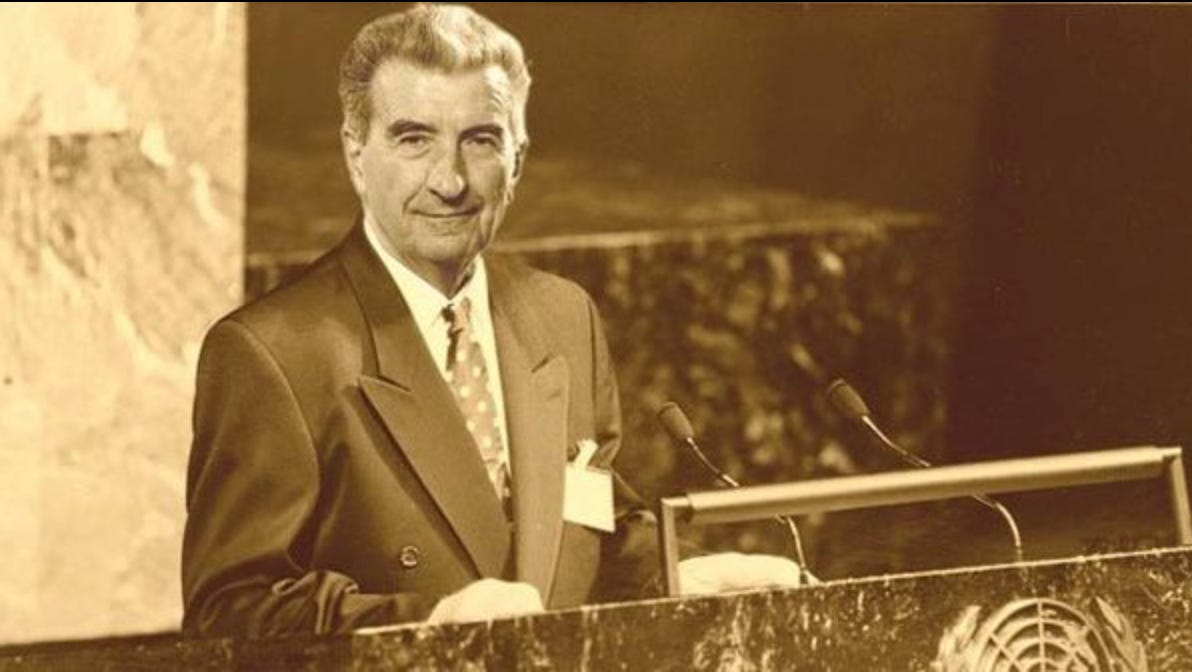November 1992.
The agreement between Serbs and Croats opened up a new war front in Bosnia and Herzegovina, the Croat-Bosniak conflict [you can listen to the latest episode of BarBalkans - Podcast here].
While the forces of the Croatian Republic of Herzeg-Bosnia advance into Western Herzegovina, the army of the Serbian President, Slobodan Milošević, conquer the entire region bordered by the Sava river, between Bosnia and Croatia.
The Serbian Republic of Krajina and Republika Sprska proclaim their union, the first step for the creation of the Greater Serbia.
With the conquest of Jajce, everything seems to go in the right direction for Milošević.
But the Western Balkans have become breeding ground for instability, crossing the Bosnian borders.
The isolation of the Yugoslav Federation
November kicks off with the plenary session of the Conference on Security and Cooperation in Europe (CSCE) in Prague, that shuffles cards of international diplomacy.
The report presented between November 5 and 6 has a paramount impact, comparable only to Roy Gutman’s report on Serbian concentration camps in occupied territories of Bosnia and Herzegovina in July.
The atrocities and ethnic cleansing carried out in Bosnia and Croatia by Milošević’ army are finally written on an official document. And the conclusion is historical: the need for the establishment of an international court for war crimes.
The UN Special Rapporteur on the human rights situation in the territory of the former Yugoslavia, Tadeusz Mazowiecki, sheds light also on the «systematic violations» of minority rights in Kosovo, Vojvodina and the Sandjak.
Considering the warnings that more than 400 thousand people could die of hunger, cold and disease in Bosnia in the winter of 1992, the UN Security Council can no longer delay.
On November 16, Resolution 787 increases the resources of the United Nations Protection Force (UNPROFOR) and tightens economic sanctions against the Federal Republic of Yugoslavia.
But there is more. The international community is urged to take «all necessary measures» to block the naval transit towards Yugoslavia.
The joint NATO and UEO (Western European Union) fleet consolidates its presence not only in the Adriatic Sea, but also on the Danube.
No observers are sent to the border with Bosnia, to prevent arms smuggling, while nine days later Resolution 795 gives the green light to a specific request of the Macedonian President, Kiro Gligorov.
Around 900 UN Blue Helmets are deployed along the border with Albania and Serbia, to send a clear message to Belgrade.
The international community no longer tolerates the threats of a possible spread of the conflict in Kosovo and Macedonia to counter the penetration of Islam into the Balkan region.
From Kosovo to Macedonia
The tensions in Belgrade are increasingly triggered by the open clash between Milošević and the Federal Prime Minister, Milan Panić (chosen by the Serbian President himself in June), ahead of the parliamentary and presidential elections on December 20.
Panić’ candidacy is formalized only at the end of the month. In the previous weeks, he works on an internal faction against Milošević, trying to convince the ethnic-Albanian voters not to boycott the vote.
This tactic becomes crystal clear when he visits the leader of the Democratic League of Kosovo, Ibrahim Rugova, even if it costs him the mark of “traitor” by the Serbian nationalists.
Milošević’ narrow circle starts talking about a possible civil war between the supporters of the two contenders for the Presidency of Serbia. A civil war with inevitable ethnic and religious connotations (Albanians against Serbs, Muslims against Orthodox).
In other words, it would be the fuse to definitively blow up the region, beyond the borders of Bosnia and the Croatian region of Krajina.
Not to mention the fact that Turkey, Iran, Pakistan, Saudi Arabia and the Arab Emirates might be interested in intervening militarily in the Western Balkans, if the conflict extended to Kosovo.
This is the very first time that the possibility of a collapse of the geopolitical order in the region seems so real, with unpredictable consequences for Europe and the United States.

For the moment, the result is an increase in ethnic tensions in Macedonia.
The Republic became independent on September 25, 1991. A few months later, a divide is created between ethnic Macedonians and ethnic Albanians, as the Muslim-majority regions claim more autonomy.
On November 6, a series of incidents in Skopje cause the death of three ethnic Albanians civilians and an ethnic Macedonian police officer.
This is another wake-up call for the UN Security Council that the situation in the whole region - and not only in Bosnia - must be kept under control.
If you know someone who can be interested in this newsletter, why not give them a gift subscription?
Here is the archive of BarBalkans - Podcast:
And here the summary of 1991.















Share this post